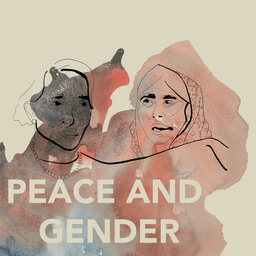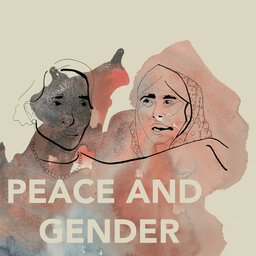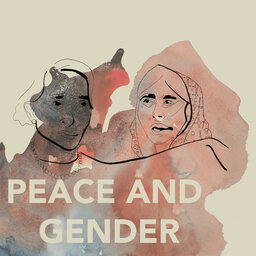In this episode, Andrea Thiis-Evensen talks with Betty Barkha, a PhD student at Monash who grew up in Fiji, with cyclones raging outside her window, watching whole villages disappear under the water. Betty has now worked with development for eight years, focusing on the effect climate change has on women.
EPISODE TRANSCRIPT
Andrea Thiis-Evensen: Hey. My name is Andrea Thiis-Evensen and welcome back to Peace and Gender. In this podcast, I'm trying to highlight the issues around gendered inequalities, by meeting the people who are actually seeking solutions, getting to know both the research and their personal story.
Betty Barkha: I think, just the constant fear every single time we have a cyclone warning and the fear of not knowing how devastating it will be is scary.
Andrea Thiis-Evensen: That is Betty Barkha. Betty is a PhD student at Monash. She grew up in Fiji. She has a pretty clear area of interest, an issue that she has decided to dedicate her life to try and improve.
Betty Barkha: Essentially - and not just because I'm from the Pacific - it's climate change. It's because it's not a reality just for the Pacific Islanders or people facing typhoons or hurricanes. It's a reality for all of us. Things are changing. The environment is changing and we need to get onto it. We need all hands on deck, taking action. That's exactly why I'm studying climate change and its risks and how we can fast-track this process and make sure that we do no harm in the process and that voices are heard. Nothing gets left behind.
Andrea Thiis-Evensen: What started Betty's burning interest in climate change?
Betty Barkha: During my first year in university, there was a bunch of young leaders across the Pacific who had come into Fiji for a Pacific climate leadership workshop organised by 350.org. Towards the conclusion of that, there was this incredible man, Ben, from the Marshall Islands. He stood up in front of us with tears in his eyes and said, when I stand in the middle of the largest island, and I throw a stone this side, it reaches the ocean. When I throw a stone that side, it reaches the ocean. He stood there in a room full of about 80 people and begged for us to send him sand to save his island home and we couldn't. We just couldn't send him sand to save his island home.
Andrea Thiis-Evensen: That was the start of Betty's journey to advocate for climate change. This was a decade ago, when she was first-year undergrad in Fiji. What she experienced that day had a ripple effect.
Betty Barkha: It definitely led to a movement in the Pacific for young leaders. There's been a few pockets of movements. There's Pacific Island Represent, there's Pacific Climate Warriors, there's National Climate Warriors that do a lot of climate action within their countries. Essentially, what it led to was the rise of a youth climate movement in the Pacific. That climate movement has been brilliant. It's been on the frontlines of advocating for divestment in Australia - in Australian banks. It's also been taking into UN spaces and taken space and spoken on what's definitely impacting them, why they're on the frontline, why things need to change. It led to the rise of a movement in the Pacific that definitely connects to the larger movement, Globally.
Andrea Thiis-Evensen: Betty has worked with development for over eight years for various organisations in the Asia Pacific. She is the youngest member on the board of directors of the Association of Women in Development. She's also an advisor with FRIDA Young Feminist Fund and a member of the Women Deliver Young Leaders Program. Betty advocates strongly for climate change and, being from Fiji, climate change is something that Betty has grown up with.
Betty Barkha: It's scary, every single time you hear tin rattling, because our roofs are made of tin. That's scary. I think our fear would always be if it would be our tin or our home. I think it's just scary, being able to visualise that sort of thing.
Andrea Thiis-Evensen: Betty went back home to Fiji in the beginning of 2018. What she was hearing, outside her window, was the massive cyclone Josie, which would be followed by the even more damaging cyclone, Kenny. This was not new to Betty and her family.
Betty Barkha: As a kid, we were living in a village and our home used to be the concrete home in the village. We would have about 25 people living with us during cyclones. That would probably be the best times ever as an adult, now, the last cyclones in early 2018 saw me being petrified. I would never want that to happen to anyone again, but I know that it was still a reality for so many. Water seeps out of nowhere. You just don't know and you don't know what to do at that point, when you're in a state of shock. You're just left in a state of trauma. You're just like, it's going to blow up. Something's going to fall. Even for us, it was always - my mum would just be super-scared because we have a huge pine tree behind our home. She would be like, this cyclone it's going to fall. This cyclone it's going to fall. If it falls our home is entirely damaged and that would just mean destruction, essentially. I think, just the constant fear every single time we have a cyclone warning and the fear of not knowing how devastating it will be is scary.
Andrea Thiis-Evensen: The two cyclones in early 2018 resulted in heavy rainfall, flash flooding, and destructive winds. Thousands of people were displaced and lost their homes. In the aftermath of the destruction, Beth and her family did all they could to help.
Betty Barkha: When mum realised where the water levels had gone to and she realised it was a community that she grew up with, we cooked meals for about 50 people at home and took it out there. All their stuff was lost and they wouldn't be able to cook meals. Then, when we went there, this is pretty high ground, far away from sea level or a river but three quarters of their homes were underwater. Then, the women there were - the men would come and take their food and it was okay, because maybe something else was on their mind. The women would be like, there's no water. There's no water. We can't do it. There's no water to drink. There's no water to clean. There was just no water, so all they could do was sit and wait. That was pretty sad.
One of the best parts about being from a small island country is you sort of know friends here and there. I had a friend in the water authority, who could very quickly mobilise water trucks into that area. I just gave him a call and within the next 24 hours, there were water trucks going into that area.
In terms of clothes and beddings and sanitary pads, I got in touch with this incredible group that I'm an alumni of, which is called Emerging Leaders Forum. We're a bunch of 80 girls who have graduated from a year-long project, which is focusing on women and their issues in Fiji. We instantly got in touch and were like, okay, we're going to get a sanitary pad drive. If you've got things, we're just going to transfer them into this localities, where we can identify people need them. We got them down within a matter of two days.
Andrea Thiis-Evensen: In addition to the destruction and problems that people were facing, in the aftermath of the cyclones, sanitary pads were running out of stock. Betty and her family had to get their friends from nearby places, such as Suva, to transport sanitary pads to them. Even this was tricky, because the roads had been damaged.
Betty Barkha: Obviously, when you have a larger team working on it, the impact is higher. It was just me and my family. There were just four of us doing this. If the four of us could have that sort of mobilisation result, imagine what the results would be if all of us got things done.
Andrea Thiis-Evensen: Betty experienced how women were extra-vulnerable to climate change effects, such as cyclones.
Betty Barkha: Every single time a disaster strikes, the reports would always show that there's no safe space for women. There would always be a time that we'd have to run a sanitary pad drive, because they were never included in the kits that go into these disaster centres that are where people are seeking refuge after a disaster. I think that was just a clear indication of where there was a gap and what needed more attention. We have a lot of amazing groups doing this sort of sanitary drives and I think, knowing that women are heavily impacted in terms of a lot of things - in terms of security, hygiene, wellbeing, when a disaster strikes. I think I just want to be able to be a source for women's voices to be amplified. What role do they play? Do their voices ever get counted? Why are their voices not being counted, you know? Something like that.
Andrea Thiis-Evensen: This is what Betty is writing her PhD on now.
Betty Barkha: My PhD's broadly going to be focused around climate displacement of people. In this process, I hope to be able to connect with women on the ground, who've been relocated, or have chosen to move from one place to another, or have been forced to move from one place to another - just being able to understand what their role has been in the process and how they have been impacted. For what it's worth, it could have various forms. I think it's important.
I'd like to highlight a story from Fiji, actually, where we have a village in the Northern island of Vanua Levu. We've relocated a village of about 300 villagers, because they were a coastal village. Now they've been moved to higher ground, but within the village boundaries. It turns out that the women think that this relocation has done them really good. Now they've got electricity, water supply, their homes are better-constructed to handle cyclones. That was really exciting for me to know.
Then, there was this other community on the side of this story. In January, I was in Kiribati for a work visit. I would sit, in the afternoons, with these village women who would run the guesthouse I was staying at. They would be telling us that we want our young women to get married and get out of the island, because climate change is going to kill us. We won't leave but we want our young women to leave the island. That just surprised me, because that was their way of coping. That was what they were doing.
Andrea Thiis-Evensen: Why did it surprise you?
Betty Barkha: I think it was just surprising, how they thought that their young women wanted to be moving away from the island while they were not okay - they didn't want to leave the island. They thought that, in order to save their young women, it was okay for them to be moved to another island and marriage was the only way that they could see. That surprised me.
Andrea Thiis-Evensen: Betty tells me how the attitude around climate change has shifted.
Betty Barkha: There has been a great rise in the moral consciousness of people recognising that, yes, it's an actual threat. There needs to be something done. We know there are a few things that's within our reach that we can change and we're onto it, but there are a few things that are not within our reach and we need everybody on board to be able to do it. We need our leaders, we need our community leaders, we need our communities to be part of this process. We can't leave anybody behind, when we're trying to change that sort of framework. I think that's been really exciting
Andrea Thiis-Evensen: What is within her reach when it comes to making change?
Betty Barkha: I think it's very easy to advocate for changes, say, in terms of getting people to be aware that, okay, climate change is happening. In the case for Fiji, say, for instance, which is a very relevant example that I noticed, is that, in the last year, there were two cyclones that hit Fiji within a week. Previously, while I was growing up as a kid, there'd be warnings around cyclones and nobody would take it seriously. You would still see people on the streets, people going out swimming. Now, in that instant - this was probably early 2018 - when the government and the offices let out particular warnings that a cyclone's coming, people were prepared. Cyclone packs were prepared. People were ready. People were not leaving their homes. People had locked down their homes. People had prepared cyclone kits. People had moved to upper ground before a cyclone came. That, I think, was a brilliant show of exactly how things have translated on-ground. This definitely wasn't the result of one particular organisation or community. It was engaging with the government, with private sector partners, with NGOs, making sure that communities were actually involved in this whole process and be like, no. This is real. Let's move.
Andrea Thiis-Evensen: Betty has seen climate change outside her window. She's heard the roof shaking over her head. She's witnessed people begging for sand to save their island homes and she has seen whole villages underwater.
Betty Barkha: We really just need to speak up now. Time's now. We're literally fighting for livelihoods and security. As the Pacific Climate Warriors like to say, we are not drowning. We are fighting. We are. We're constantly fighting for our livelihoods and our lives and our homes. We're not giving up. We just want the world to not give up on us too.
Andrea Thiis-Evensen: That was Betty Barkha. Thank you so much for listening to this episode of Peace and Gender. My name is Andrea Thiis-Evensen, and this podcast was produced for Monash Gender Peace and Security and Mojo News.
Music: "Solitude" by Broke for free – Creative Commons Attribution-NonCommercial-
Artwork: Shayla Rance
 Peace and Gender
Peace and Gender

